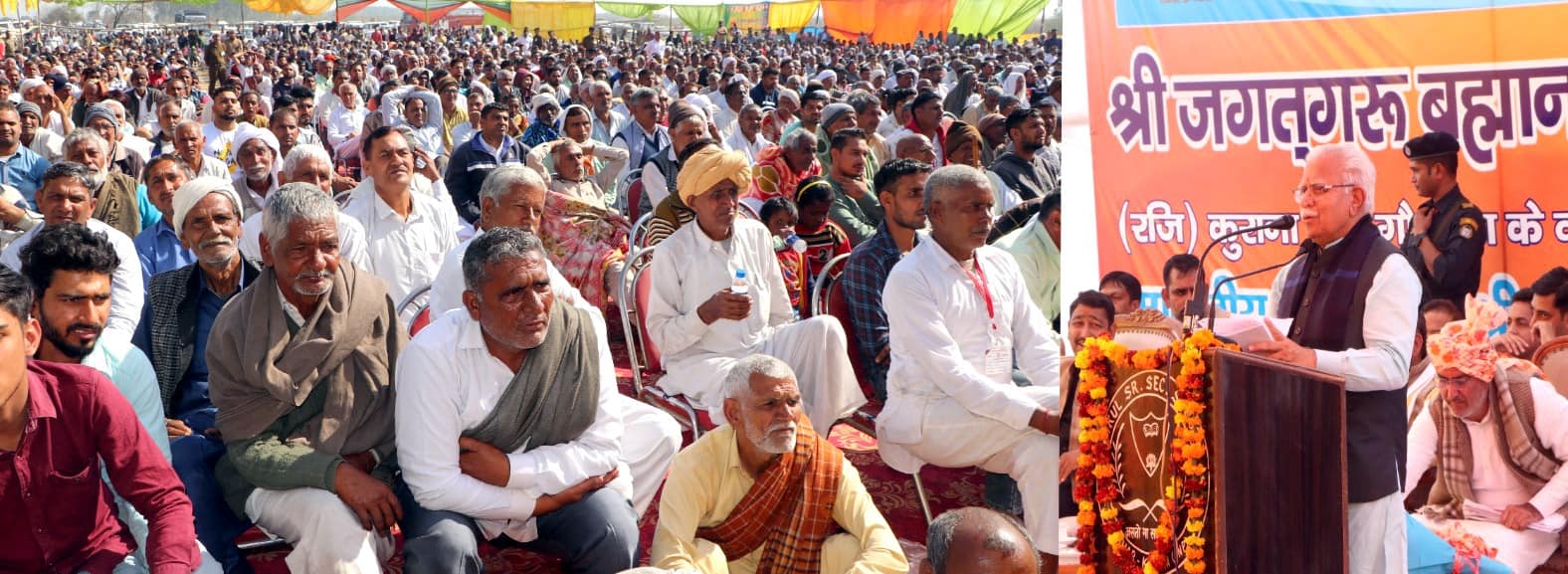
Chandigarh, February 5: Chief Minister, Sh. Manohar Lal said that the state government is taking effective steps to make the state's gaushalas self-reliant. He said that a grant of Rs 30 crore is given every year for fodder of cattle. The Chief Minister was addressing on the occasion of the anniversary celebration of Shri Jagat Guru Brahmanand Gaushala in Panipat’s Kurana village.
Kurana village will be developed under Mahagram Yojana
The Chief Minister approved several demands for Kurana village. He approved the demand for widening four roads of the village to five and a half meters. With the population of the village being more than 10,000, the Chief Minister also announced to give the benefit of Mahagram Yojana to Kurana village, along with an assistance of Rs 21 lakh for Shri Jagat Guru Brahmanand Gaushala, Kurana.
Apart from this, Member of Parliament, Sh. Sanjay Bhatia and Rajya Sabha member, Sh. Krishan Lal Panwar announced Rs 11 lakh each and MP Arvind Sharma announced Rs. 2.50 lakh for the Gaushala.
The Chief Minister said that cow is considered a symbol of Indian civilization, culture and traditions. Cow has been given the status of mother in religious texts and is worshipped.
Emphasizing to make the cow a means of livelihood for the farmers again, he said, “For this, we have to take effective steps for the conservation and promotion of indigenous breeds of cows. Under the Rashtriya Gokul Mission, Gokul Gram is being established at Government Livestock Farm, Hisar. The Haryana Gauvansh Research Centre has been opened in Panchkula by the Haryana Gau Seva Aayog. In this, research work is going on more phosphate rich organic manure and vermicompost.”
The Chief Minister said that any registered Gaushala which needs grant can put its demand on the Saral Portal. Apart from this, solar power plants have been installed in 330 gaushalas in the state under the Mukhyamantri Gaushala Jagmag Yojana. He said that for marketing Panchgavya products made from cow dung, cow urine etc; marketing platforms would be made available in rural industrial parks located near cow shelters.
In order to encourage cattle rearing in the state, the Chief Minister said that interest subsidy is being provided to the beneficiaries on the bank loans taken for the purchase of cows; after setting up a dairy of 20 indigenous breeds of cows, such as Haryana, Sahiwal, Belahi, Tharparkar, Gir etc. Also, 50 percent subsidy is given to the cattle rearers who open dairies of 3 and 5 cows of indigenous breed. He said that four cattle breeding and research centres have been set up in Kaithal's Keorak village, Jhajjar's Lakdiya, Karnal's Uchani, and Mahendragarh at a cost of Rs 37 crore for the improvement of the breed of indigenous cow
He said that the government has implemented the Haryana Gauvansh Sanrakshan and Gausamvardhan Act 2015, under which a provision has been made for imprisonment of up to 10 years and a fine of up to Rs 1 lakh; for the person who kills a cow. A provision has been made for imprisonment of up to 7 years for cow-smuggling and fine up to Rs 70,000 in addition to confiscation of the vehicle used.
“Apart from this, a state-level special cow protection task force has been constituted to prevent cow slaughter and cow-smuggling. Beef testing labs have been set up in Faridabad and Yamunanagar to punish the culprits of cow slaughter. Two cow shelters have been established at Panipat’s Nain village and Hisar’s Dhandhur village to keep destitute cattle,” said the Chief Minister.
To make the gaushalas self-reliant, he called upon the Gaushala operators to lay emphasis on the production of natural phenyl, organic manure, cow dung utensils, natural paint, pot, lamp, incense, soap and other products from cow urine and dung.
On the occasion, MPs Sh. Krishan Lal Panwar, Sh. Sanjay Bhatia, Sh. Arvind Sharma, Gharaunda MLA Sh. Harvinder Kalyan, Panipat Rural MLA, Sh. Mahipal Dhanda, Panipat Urban MLA, Sh. Pramod Vij, Uttarakhand DGP, Sh. Ashok Garg, Shri Jagat Guru Brahmanand Gaushala Samiti president, Sh. Naresh Garg, besides a large number of people were present.



